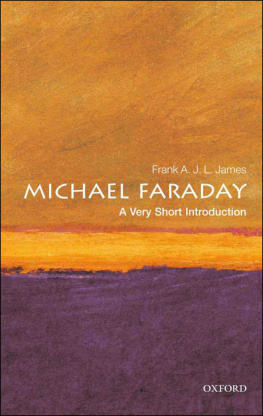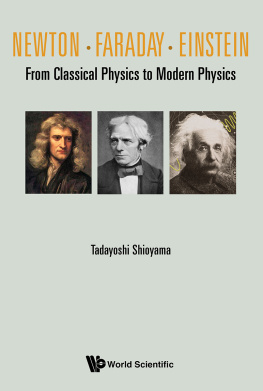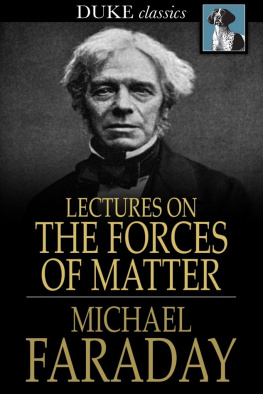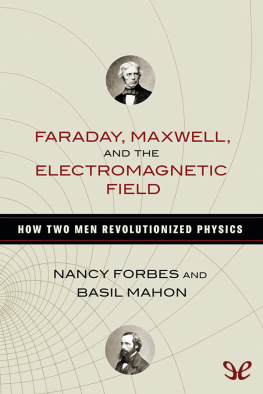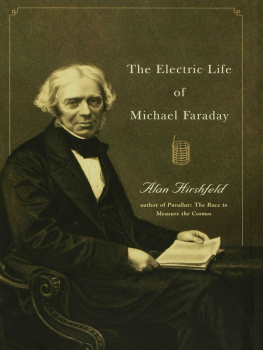Faraday Michael - Michael Faraday
Here you can read online Faraday Michael - Michael Faraday full text of the book (entire story) in english for free. Download pdf and epub, get meaning, cover and reviews about this ebook. City: Great Britain, year: 2014, publisher: Walter Jerrold, genre: Detective and thriller. Description of the work, (preface) as well as reviews are available. Best literature library LitArk.com created for fans of good reading and offers a wide selection of genres:
Romance novel
Science fiction
Adventure
Detective
Science
History
Home and family
Prose
Art
Politics
Computer
Non-fiction
Religion
Business
Children
Humor
Choose a favorite category and find really read worthwhile books. Enjoy immersion in the world of imagination, feel the emotions of the characters or learn something new for yourself, make an fascinating discovery.

- Book:Michael Faraday
- Author:
- Publisher:Walter Jerrold
- Genre:
- Year:2014
- City:Great Britain
- Rating:3 / 5
- Favourites:Add to favourites
- Your mark:
- 60
- 1
- 2
- 3
- 4
- 5
Michael Faraday: summary, description and annotation
We offer to read an annotation, description, summary or preface (depends on what the author of the book "Michael Faraday" wrote himself). If you haven't found the necessary information about the book — write in the comments, we will try to find it.
Michael Faraday — read online for free the complete book (whole text) full work
Below is the text of the book, divided by pages. System saving the place of the last page read, allows you to conveniently read the book "Michael Faraday" online for free, without having to search again every time where you left off. Put a bookmark, and you can go to the page where you finished reading at any time.
Font size:
Interval:
Bookmark:
Back at Work.
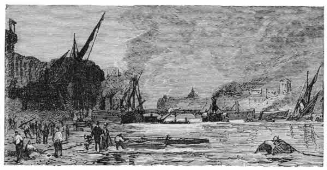
"A choice that from the passions of the world
Withdrew, and fixed me in a still retreat;
Sheltered, but not to social duties lost,
Secluded, but not buried; and with song
Cheering my days, and with industrious thought;
With the ever-welcome company of books;
With virtuous friendship's soul-sustaining aid,
And with the blessings of domestic love."
Wordsworth.
His friends and relations having had due attentions from him, Faraday at once began to cast about for work. On going abroad with Davy he had relinquished his position at the Royal Institution, though Sir Humphry had promised to befriend him on their return; this promise was, much to Faraday's gratification, duly fulfilled. Within a fortnight of his return Michael found himself re-engaged at the Institution in the capacity of "assistant in the laboratory and mineralogical collection, and superintendent of the apparatus," a high-sounding office that carried with it the none too substantial honorarium of thirty shillings a week, and, as before, rooms in the building. It was, however, a distinct rise, both in position and in wage, and Faraday, we may be sure, was pleased to get back to his well-loved Institution on such terms.
A life spent in scientific research is, generally, an apparently uneventful one. Faraday's life, far from being an exception to this rule, was rather an accentuation of it. The story of his life is indeed highly interesting; but its interest lies in it, not as a story of action and change, but as a life that may be said to have realised almost wholly the ideal which was set before it. From the very first moment when Faraday gave expression to his hate for trade and his love for science, his whole life was a practical illustration of his feelings; as we shall find on following him through his great and honourable career, there were many occasions on which he refused not only titles and such like honours, but pecuniary benefits which might fairly be considered his duesno, "his work was wrought for love and not for gain," as the line which I have placed on the title page of this little book so well expresses it.
The tour on the Continent, as has been noted, was the most striking episode in Faraday's long life. From May 7th, 1815 (the date on which he rejoined the Institution), onwards, his life was a time of steady intellectual growth, spent in chemical research, in the explaining of phenomena, and in what is by no means his least claim on our regard, the popularisation of scientific knowledge. We have seen in his early correspondence with Benjamin Abbott how, on his very earliest acquaintance with lecturing and lectures at the Royal Institution, he began to study the different styles of the various lecturers, to note their peculiarities, and in what lay the secret of their success; we have seen, too, how he was striving to improve himself in compositionin the clear and intelligent method of stating things. He was preparing himself betimes for what he felt to be part of his true vocation; how eminently successfulbeyond his wildest imaginingshe was, will be seen as we follow his life-story year by year.
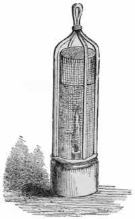
THE DAVY SAFETY LAMP.
It was, as Faraday frequently acknowledged, his good fortune to assist Sir Humphry Davy in his experiments not only while abroad, but after their home-coming. One of the most important of all Davy's discoveries was made in the year of their return. On August 3rd he acknowledged a letter which he had received from Dr. Gray, directing his attention to the awful destruction of human life by explosions in coal mines. On October 31st, Davy announced to his correspondent that he had discovered a "safety lamp;" on November 2nd he read a paper on fire-damp before the Royal Society, and on December 14th submitted to Dr. Gray models of lamps and lanterns made on the principle of his discovery, "that fire-damp will not explode in tubes or feeders of a certain small diameter." In his experiments, in connection with this discovery, Davy received considerable help from his laboratory assistant, who must have been much gratified by that passage in Davy's paper on the "safety lamp," in which the great discoverer expressed himself as "indebted to Mr. Michael Faraday for much able assistance." This was "Mr. Michael Faraday's" first public recognition, and must have been very delightful to him, especially coming as it did from the man of all others for whom, in his scientific capacity, Michael had the most profound admiration.
Davy gained, as is well known, much honour and no inconsiderable amount of money for his discovery. There are, however, circumstances in which the safety lamp is not safe; Faraday, and, it is to be presumed, Davy himself, was aware of this. It is illustrative of Faraday's stern regard for truth that, although he was at the time Davy's own assistant, he did not, and would not, attest before a parliamentary committee to the universal safety of the Davy lamp.
Early in 1816 we find Faraday beginning to put into practice those ideas on lectures and lecturing which he had so carefully considered before. On the point of giving his first lecture, though, he seems to doubt himself, and in a letter to Abbott occurs the following passage"I intend making some experiments on that subject (lecturing) soon; I will defer it (his letter on lecturing) till after such experiments are made. In the meantime, as preparatory and introductory to such a course of experiments, I will ask your opinion of, and observations on, English compositionstyle, delivery, reading, oratory, grammar, pronunciation, perspicuity, and in general all the branches into which the belles lettres divide themselves; and if by asking I procure, I shall congratulate myself on the acquisition of much useful knowledge and experience."
The first lectureon the "General Properties of Matter"was duly and successfully delivered before the City Philosophical Society on January 17th. Before trusting himself to go upon the platform, Faraday carefully wrote out his lecture, word for word, as it was to be delivered; a plan which he followed in the case of each of the other six lectures which he gave before the same Society during the year. These lectures I have had the pleasure of seeing, as they are neatly written out and bound by their author. They are, with many similar treasures, in the possession of Miss Jane Barnard, a niece of Faraday.
This year was an important one in several ways; not only did Faraday give his first lecture, but also his first printed paper appeared in the Quarterly Journal of Science , which was edited by Mr. Brande, who succeeded Sir Humphry as chief of the Royal Institution. The paper was on an analysis of native caustic lime, which had been undertaken at Davy's instigation. That his scientific friends and patrons were beginning to recognise something out of the common in their laboratory assistant is shown in various ways, notably by such a passage as the following, taken from Faraday's note-book: "When Mr. Brande left London in August, he gave the Quarterly Journal in charge to me; it has had very much of my time and care, and writing, through it, has been more abundant with me. It has, however, also been the means of giving me earlier information on some new objects of science."
Faraday's common-place booka kind of continuation of his Philosophical Miscellany of six years earliergives us a good deal of information as to his intellectual progress at this time; it shows us not only what scientific subjects were interesting him, but also how zealously he was continuing his study of composition and the mode of expressing what he had to say clearly and definitely. There are passages from the Spectator , alongside of tests with arsenic, a description of a visit to a silk-ribbon dresser's, along with an account of Zerah Colburn, the American calculating boy. Sir Humphry Davy wrote to Faraday, saying, "Mr. Colburn, the father of the American boy who has such extraordinary powers of calculation, will explain to you the method his son uses in confidence. I wish to ascertain if it can be practically used."
Font size:
Interval:
Bookmark:
Similar books «Michael Faraday»
Look at similar books to Michael Faraday. We have selected literature similar in name and meaning in the hope of providing readers with more options to find new, interesting, not yet read works.
Discussion, reviews of the book Michael Faraday and just readers' own opinions. Leave your comments, write what you think about the work, its meaning or the main characters. Specify what exactly you liked and what you didn't like, and why you think so.

